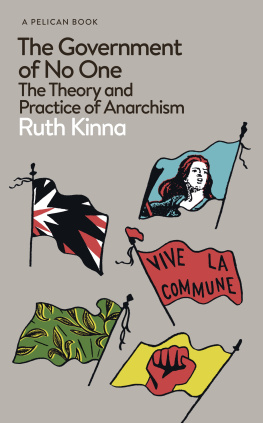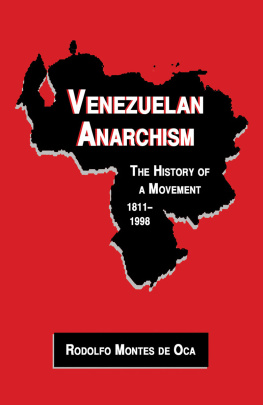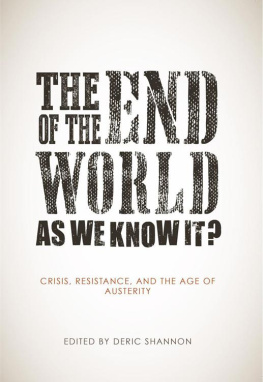Ruth Kinna - Anarchism: A Beginners Guide
Here you can read online Ruth Kinna - Anarchism: A Beginners Guide full text of the book (entire story) in english for free. Download pdf and epub, get meaning, cover and reviews about this ebook. year: 2005, publisher: Oneworld Publications, genre: Politics. Description of the work, (preface) as well as reviews are available. Best literature library LitArk.com created for fans of good reading and offers a wide selection of genres:
Romance novel
Science fiction
Adventure
Detective
Science
History
Home and family
Prose
Art
Politics
Computer
Non-fiction
Religion
Business
Children
Humor
Choose a favorite category and find really read worthwhile books. Enjoy immersion in the world of imagination, feel the emotions of the characters or learn something new for yourself, make an fascinating discovery.
- Book:Anarchism: A Beginners Guide
- Author:
- Publisher:Oneworld Publications
- Genre:
- Year:2005
- Rating:3 / 5
- Favourites:Add to favourites
- Your mark:
- 60
- 1
- 2
- 3
- 4
- 5
Anarchism: A Beginners Guide: summary, description and annotation
We offer to read an annotation, description, summary or preface (depends on what the author of the book "Anarchism: A Beginners Guide" wrote himself). If you haven't found the necessary information about the book — write in the comments, we will try to find it.
Anarchism: A Beginners Guide — read online for free the complete book (whole text) full work
Below is the text of the book, divided by pages. System saving the place of the last page read, allows you to conveniently read the book "Anarchism: A Beginners Guide" online for free, without having to search again every time where you left off. Put a bookmark, and you can go to the page where you finished reading at any time.
Font size:
Interval:
Bookmark:

ONEWORLD BEGINNERS GUIDES combine an original, inventive, and engaging approach with expert analysis on subjects ranging from art and history to religion and politics, and everything in between. Innovative and affordable, books in the series are perfect for anyone curious about the way the world works and the big ideas of our time.
aesthetics
africa
anarchism
aquinas
art
artificial intelligence
the bahai faith
the beat generation
biodiversity
bioterror & biowarfare
the brain
british politics
the buddha
cancer
censorship
christianity
civil liberties
classical music
climate change
cloning
cold war
conservation
crimes against humanity
criminal psychology
critical thinking
daoism
democracy
descartes
dyslexia
energy
engineering
the enlightenment
epistemology
evolution
evolutionary psychology
existentialism
fair trade
feminism
forensic science
french literature
french revolution
genetics
global terrorism
hinduism
history of science
humanism
huxley
islamic philosophy
journalism
judaism
lacan
life in the universe
literary theory
machiavelli
mafia & organized crime
magic
marx
medieval philosophy
middle east
NATO
nietzsche
the northern ireland conflict
oil
opera
the palestineisraeli conflict
paul
philosophy of mind
philosophy of religion
philosophy of science
planet earth
postmodernism
psychology
quantum physics
the quran
racism
renaissance art
shakespeare
the small arms trade
the torah
sufism
volcanoes


anarchism: a beginners guide
Oneworld Publications
(Sales and Editorial)
185 Banbury Road
Oxford OX2 7AR
England
www.oneworld-publications.com
Ruth Kinna 2005
This ebook edition published in 2012
All rights reserved
Copyright under Berne Convention
A CIP record for this title is available from the British Library
paperback 978-1-85168-370-3
ebook 978-1-78074-127-7
Typeset by Jayvee, Trivandrum, India
Cover design by the Bridgewater Book Company
acknowledgements
A number of people have helped in the production of this book. Many thanks to Sharif Gemie and Vasilis Margaras for reading and commenting on early drafts, and to Dave Berry for generously giving his time to share his extensive knowledge of anarchist labour history as well as lending some valuable materials. Thanks also to Simon Tormey who read and offered helpful comments on the original manuscript. Sadly, none of them have managed to iron out all the creases, but Im very grateful for their help and encouragement. The production team at Oneworld especially Victoria Roddam, who suggested the project, Mark Hopwood and Judy Kearns have been extremely helpful and Im grateful for their responsiveness and patience in seeing the book through.
Finally, Id like to thank family and friends some I didnt know I had who helped out in the dark days of 20023 and especially to Robert and Andrew who bore the brunt of those times. This book is for them.
introduction
This book falls into four chapters, each organized around a particular theme: (i) the ideology of anarchism; (ii) anarchist conceptions of the state; (iii) principles of anarchist organization (ideas of anarchy); and (iv) strategies for change.
The first chapter begins by introducing the terms anarchism, anarchist and anarchy and then discusses the problems anarchists have encountered with popular conceptions of anarchy. The main body of the chapter looks at three different approaches to anarchism. The first seeks to understand the core principles of anarchism by abstracting key ideas from the works of designated anarchist thinkers. The second emphasizes the broadness of the ideology by categorizing anarchists into a variety of schools or traditions. The third approach is historical and argues that anarchism developed in response to a peculiar set of political circumstances, active in the latter decades of nineteenth-century Europe. The aim of this chapter is to suggest that anarchism can be defined as an ideology by the adherence of anarchists to a core belief namely, the rejection of the state.
The second chapter considers some of the ways in which anarchists have theorized the state and the grounds on which they have called for its abolition. It looks in particular at anarchist ideas of government, authority and power and it uses these ideas to show why anarchists believe the state to be both detrimental and unnecessary. Anarchists sometimes suggest that they are wholly opposed to government, authority and power, but the chapter shows how these concepts are incorporated into anarchist theories to bolster anarchist defences of anarchy. Finally, the chapter reviews some anarchist theories of liberty, in an effort to show why anarchists believe anarchy is superior to the state, and to illustrate the broad difference between anarchist communitarians and libertarians.
The third chapter looks at anarchist ideas of organization and some models of anarchy. It looks first at the ways in which anarchists have understood the relationship between anarchy and statelessness, and the use they have made of anthropology to formulate ideas of anarchy. The second part of the chapter considers anarchist responses to utopianism, identifies decentralized federalism as the principle of anarchist planning and outlines two utopian views of this principle. The final part of the chapter considers some experiments in anarchy, both historical and contemporary, highlighting the relationship that some anarchists posit between organization and revolutionary change.
The final chapter examines strategies for change both revolutionary and evolutionary and different methods of protest, from symbolic to direct action. The chapter includes a discussion of anarchist responses to the anti-globalization movement and reviews one of the important arguments that anti-globalization protest has raised: the justification of violence.

what is anarchism?
There cannot be a history of anarchism in the sense of establishing a permanent state of things called anarchist. It is always a continual coping with the next situation, and a vigilance to make sure that past freedoms are not lost and do not turn into the opposite ...
(Paul Goodman, in A Decade of Anarchy, p. 39)
What do we anarchists believe? ... we believe that human beings can achieve their maximum development and fulfilment as individuals in a community of individuals only when they have free access to the means of life and are equals among equals, we maintain that to achieve a society in which these conditions are possible it is necessary to destroy all that is authoritarian in existing society.
(Vernon Richards, Protest Without Illusions, p. 129)
Anarchism is a doctrine that aims at the liberation of peoples from political domination and economic exploitation by the encouragement of direct or non-governmental action. Historically, it has been linked to working-class activism, but its intellectual roots lie in the mid-nineteenth century, just prior to the era of mass organization. Europe was anarchisms first geographical centre, and the early decades of the twentieth century marked the period of its greatest success. Yet the influence of anarchism has extended across the globe, from America to China; whilst anarchism virtually disappeared after 1939, when General Franco crushed the Spanish revolution to end the civil war, today it is again possible to talk about an anarchist movement or movements. The origins of contemporary anarchism can be traced to 1968 when, to the delight and surprise of activists and disappointment and incredulity of critics student rebellion put anarchism back on the political agenda. There is some dispute in anarchist circles about the character and composition of the late-twentieth and twenty-first-century anarchism and its relationship to the earlier twentieth-century movement. But all agree that anarchism has been revived and there is some optimism that anarchist ideas are again exercising a real influence in contemporary politics. This influence is detectable in numerous campaigns from highly publicized protests against animal vivisection, millitarization and nuclear arms, to less well-known programmes for urban renewal, the development of alternative media, free education, radical democracy and co-operative labour. Anarchist ideas have also made themselves felt in the anti-capitalist, anti-globalization movement sometimes dubbed by activists as the pro-globlization movement or the movement for globalization from below.
Next pageFont size:
Interval:
Bookmark:
Similar books «Anarchism: A Beginners Guide»
Look at similar books to Anarchism: A Beginners Guide. We have selected literature similar in name and meaning in the hope of providing readers with more options to find new, interesting, not yet read works.
Discussion, reviews of the book Anarchism: A Beginners Guide and just readers' own opinions. Leave your comments, write what you think about the work, its meaning or the main characters. Specify what exactly you liked and what you didn't like, and why you think so.











